Welcome. I'm an Assistant Professor in Ethics of Technology at TU Eindhoven, specialising in the ethics of artificial intelligence and emerging biotechnologies. I'm also Senior Research Fellow of Ethics of Socially Disruptive Technologies with the ESDiT consortium.
My research explores what it means to live well with new digital technologies and bioenhancements. I'm interested in how these technologies change our understanding of the good life (especially work, health, well-being), as well as how their use is mediated by gender, cultural backgrounds, and socio-economic status.
I've recently held visiting positions at the University of Oxford's Institute for Ethics in Artificial Intelligence (2023), University of Amsterdam's Institute for Advanced Studies (2022), University of Cambridge's Centre for the Future of Intelligence (2020). I'm currently working on a Horizon Europe project with Erasmus Centre for Data Analytics on algorithmic fairness, "Fairness and Intersectional Non-Discrimination in Human Recommendation" (FINDHR).
So far I've published 20+ research papers, including articles in Journal of Value Inquiry, Philosophy & Technology, Ethics & Information Technology, Science & Engineering Ethics, Journal of Applied Philosophy, Ethical Perspectives, Digital Society, Journal of Moral Education, Social Epistemology, Mind & Society, Inquiry: Journal of Interdisciplinary Philosophy, and book chapters with Bloomsbury, Routledge, and Springer.
I've collaborated with many non-academic partners, including Royal Bank of Scotland & Natwest Group on fairness in algorithmic credit-scoring, Amsterdam Institute for Advanced Metropolitan Solutions & Responsible Sensing Lab on autonomous vehicles, and EIT Digital on gender stereotypes in self-care apps. An interview about my work on digital well-being is on the European Parliament's Science-Media Hub website.
Before starting my current positions, I was a Marie Sklodowska-Curie Research Fellow at TU Delft (2019–21) and an Early Career Innovation Fellow at University of Warwick (2019). I received a Joint Monash-Warwick PhD (highest honours) in 2019, and have an MA (Warwick) and BA (Sussex) in philosophy.
News and Upcoming
The Royal Netherlands Academy of Arts and Sciences (KNAW) recently granted an Early Career Partnership award for an international conference with world-leading digital well-being researchers.
With the help of a huge team of researchers, this has now resulted in "Reimagining Digital Well-Being: A Report for Designers & Policymakers" (co-edited with Daan Annemans). An edited volume – "The Future of Digital Well-Being" – (co-edited with Peter Königs) is currently in process. The volume will address the following topics:
+ Conceptual questions regarding the meaning and nature of digital well-being.
+ The impact of digital technologies on friendship, autonomy, self-respect, play, and communication.
+ The empirical evidence on the impact of social media on digital well-being
+ Digital well-being and (non-digital) theories of well-being
+ Generative AI and digital well-being.
+ Non-Western perspectives on digital well-being.
We've collectively written a report for designers & policy makers to summarise the research insights explored in "Future of Digital Well-Being" conference, hosted at KNAW - Koninklijke Nederlandse Akademie van Wetenschappen in early 2024. We address the following questions:
+ How to understand existing definitions of DWB?
+ How do digital & non-digital solutions help improve DWB?
+ How can we design for DWB for diverse and underrepresented groups?
+ How should cultural differences inform how we design for DWB?
Special thanks to all the co-authors, my co-editor Daan Annemans, as well as Koninklijke Nederlandse Akademie van Wetenschappen (KNAW) for funding this project through my Early Career Partnership award (2023).
Books and Edited Volumes

This open access volume explores how value sensitive design (VSD), responsible innovation, and comprehensive engineering can guide the rapid development of technological responses to the COVID-19 crisis. Responding to the ethical challenges of data-driven technologies and other tools requires thinking about values in the context of a pandemic as well as in a post-COVID world. Instilling values must be prioritized from the beginning, not only in the emergency response to the pandemic, but in how to proceed with new societal precedents materializing, new norms of health surveillance, and new public health requirements. The contributors with expertise in VSD bridge the gap between ethical acceptability and social acceptance. By addressing ethical acceptability and societal acceptance together, VSD guides COVID-technologies in a way that strengthens their ability to fight the virus, and outlines pathways to resolve today's moral dilemmas.
.jpg)
Does a flourishing life involve pursuing passionate attachments? Can we choose what these passionate attachments will be? What criteria distinguish positive passionate attachments from negative ones? This book develops a philosophical theory of how we can cultivate our passionate attachments, drawing on the resources of contemporary analytic philosophy and ancient ethics. I argue that our passionate attachments are some of the most powerful (and distinctively human) motivations in our practical lives. I also show why we have reason to view passionate attachments as susceptible to growth, change, and self-directed manipulation. Understanding how the passionate attachments can be self-cultivated offers new ways to improve our lives, both in theory and in practice. This book aims to show how ethical insights regarding the passionate attachments inform the practical task of cultivating the self.
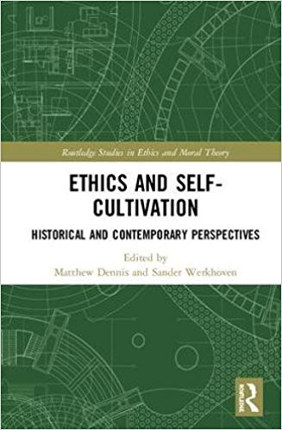
Is self-directed character change possible? How important is it from an ethical viewpoint? The aim of Ethics and Self-Cultivation is to establish and explore a new "cultivation of the self" strand within contemporary moral philosophy. The multiple authors of this volume offer a new approach to the eudaimonic tradition, showing how the self-cultivation is essential for important aspects of the flourishing life. The first section of essays looks at how ancient thinkers of self-cultivation influenced modern thinkers on this topic. The second section offers contemporary perspectives on ethical self-cultivation by drawing on work in moral psychology, epistemology of self-knowledge, philosophy of mind, and meta-ethics. Preface by Prof. Michael Slote. Epilogue by Prof. Quassim Cassam.
Peer-Reviewed Articles
According to a popular line of thought, moral exemplars have a key role to play in moral development and moral education and by paying attention to moral exemplars we can learn about what morality requires of us. However, when we pay attention to what many moral exemplars say about their actions, it seems that our moral obligations are much more demanding than we typically think they are. Some philosophers have argued that this exemplar testimony gives us reason to accept a radically demanding view of morality. We argue against this view by appealing to similar testimony from aesthetic exemplars. If we accept that the testimony of moral exemplars gives us reason to accept a radically demanding view of morality, then we should accept that the testimony of aesthetic exemplars supports a radically demanding view of aesthetic normativity. We argue that we should reject both arguments for radically demanding views, and instead see the testimony of exemplars as having something important to tell us about the nature of ideals.
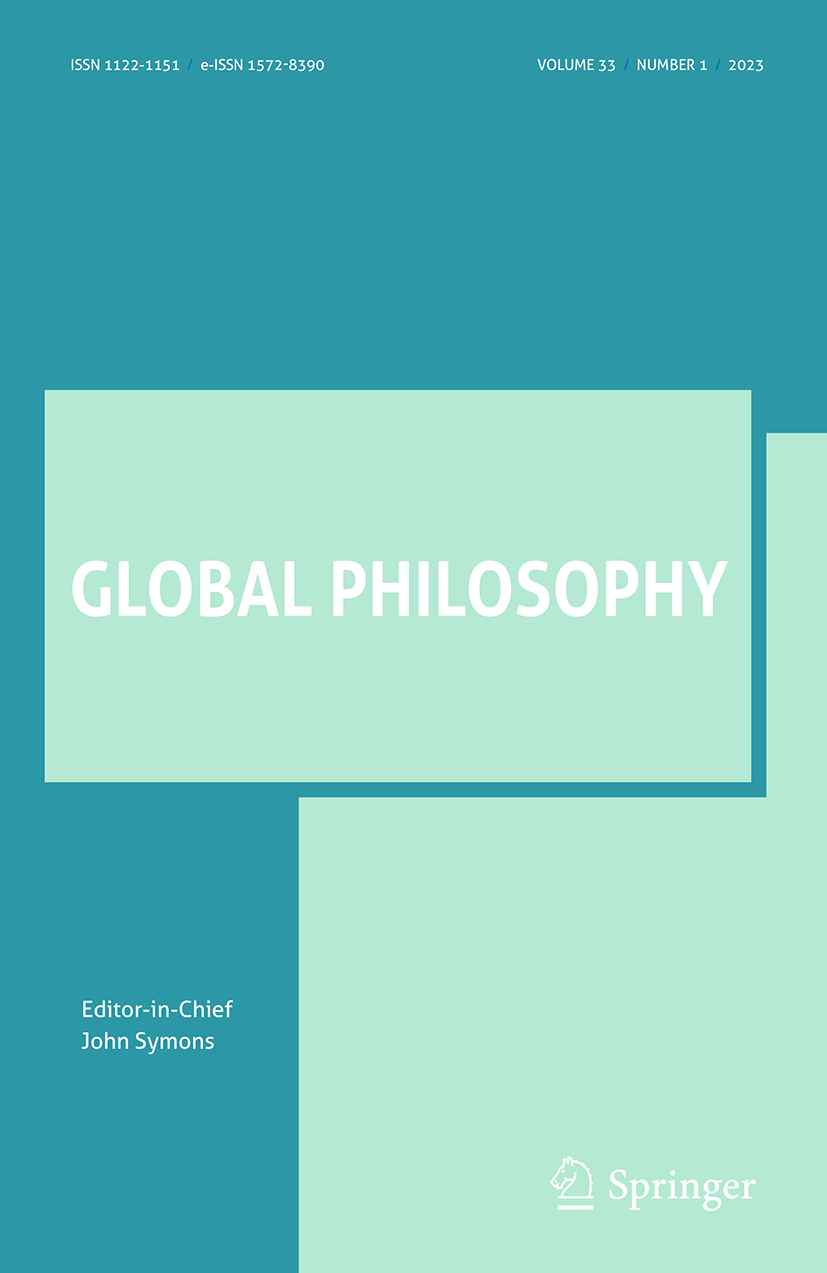
The “attention economy” refers to the tech industry’s business model that treats human attention as a commodifiable resource. The libertarian critique of this model, dominant within tech and philosophical communities, claims that the persuasive technologies of the attention economy infringe on the individual user’s autonomy and therefore the proposed solutions focus on safeguarding personal freedom through expanding individual control. While this push back is important, current societal debates on the ethics of persuasive technologies are informed by a particular understanding of attention, rarely posited explicitly yet assumed as the default. We step away from a negative analysis in terms of external distractions and aim for positive answers, turning to Buddhist ethics to formulate a critique of persuasive technology from a genuinely ethical perspective. We offer input for further philosophical inquiry on attention as practice and attention ecology. We put forward comfort/effort and individualism/collectivism as two remaining central tensions in need of further research.

The testimonies of celebrities affect the lives of their many followers who pay attention to what they say. This gives celebrities a high degree of epistemic power, which has come under scrutiny during the COVID-19 pandemic. This paper investigates the duties that arise from this power. We argue that celebrities have a negative duty of testimonial justice not to undermine trust in authoritative sources by spreading misinformation or directing attention to untrustworthy sources. Moreover, celebrities have a general imperfect duty to try to correct for an unjust distribution of attention by redirecting it to those who deserve it. During a pandemic this may become a perfect one, due to the harm that could be prevented if people follow the advice of experts. Relatedly, we argue that celebrities have an imperfect duty to promote behavior that will reduce the spread of a pandemic. We outline three ways they might do so: they might take on the position of a role model, they may act as a salience magnet or they can direct people’s attention towards others who have taken on these roles.
.jpeg)
The impact of social-media technologies (SMTs) on digital well-being has become an increasingly important puzzle for ethicists of technology. In this article, we explain why individualised theories of digital well-being (DWB) can only solve part of this puzzle. While an individualised conception of DWB is useful for understanding online self-regulation, we contend that we must seek greater understanding of how SMTs connect us. To build an account of this, we seek the conceptual resources for our account in Confucian ethics. In contrast to individualised conceptions of human flourishing that are found in the Western tradition, Confucian thinkers emphasise that individuals cannot flourish alone, but need wider social structures (partner, family, society, nation). Not only do strands of Confucian ethics explain how individuals are defined by the roles they take up in relationships, but it also makes practical suggestions for how these roles can be judiciously cultivated. We conclude our essay by identifying the Confucian notions that seem to have most promise for the design of future SMTs.

Social media technologies (SMTs) are routinely identified as a strong and pervasive threat to digital well-being (DWB). Extended screen time sessions, chronic distractions via notifications, and fragmented workflows have all been blamed on how these technologies ruthlessly undermine our ability to exercise quintessential human faculties. One reason SMTs can do this is because they powerfully affect our emotions. Nevertheless, (1) how social media technology affects our emotional life and (2) how these emotions relate to our digital well-being remain unexplored. Remedying this is important because ethical insights into (1) and (2) open the possibility of designing for social media technologies in ways that actively reinforce our digital well-being. In this article, we examine the way social media technologies facilitate online emotions because of emotional affordances. This has important implications for evaluating the ethical implications of today’s social media platforms, as well as for how we design future ones.

Designing social media technologies to promote digital well-being requires designers to face many challenges. In this article, we explore one under-explored challenge, relating to how conceptions of what it means to flourish online show significant cultural variation. We believe that today’s design-based approaches to digital well-being are hobbled by a lack of ethical attention towards important cultural variations. To remedy this, we explore the potential for an intercultural approach to digital well-being, one that respects cultural differences while preserving what culturally distinct conceptions of human flourishing have in common.

** Winner of the Eindhoven University of Technology Postdoctoral Article Award **
Global lockdowns during the COVID-19 pandemic have offered many people first-hand experience of how their daily online activities threaten their digital well-being. This article begins by critically evaluating the current approaches to digital well-being offered by ethicists of technology, NGOs, and social media corporations. My aim is to explain why digital well-being needs to be reimagined within a new conceptual paradigm. After this, I lay the foundations for such an alternative approach, one that shows how current digital well-being initiatives can be designed in more insightful ways. This new conceptual framework aims to transform how philosophers of technology think about this topic, as well as offering social media corporations practical ways to design their technologies in ways that will improve the digital well-being of users.

The COVID-19 pandemic has transformed the domains of work, education, medicine, and leisure. It has also precipitated a spike in concern regarding our digital well-being. Prominent lobbying groups, such as the Center for Humane Technology, have responded to this concern by offering a set of ‘Digital Well-Being Guidelines during the COVID-19 Pandemic.' These guidelines seek to follow the many academic insights into digital well-being over the last decade. In this article, I evaluate (1) the Center for Humane Technology’s approach, comparing it with (2) character-based strategies and (3) approaches to redesigning online architecture. I argue that each of these approaches needs to be integrated into a complete theory to digital well-being.
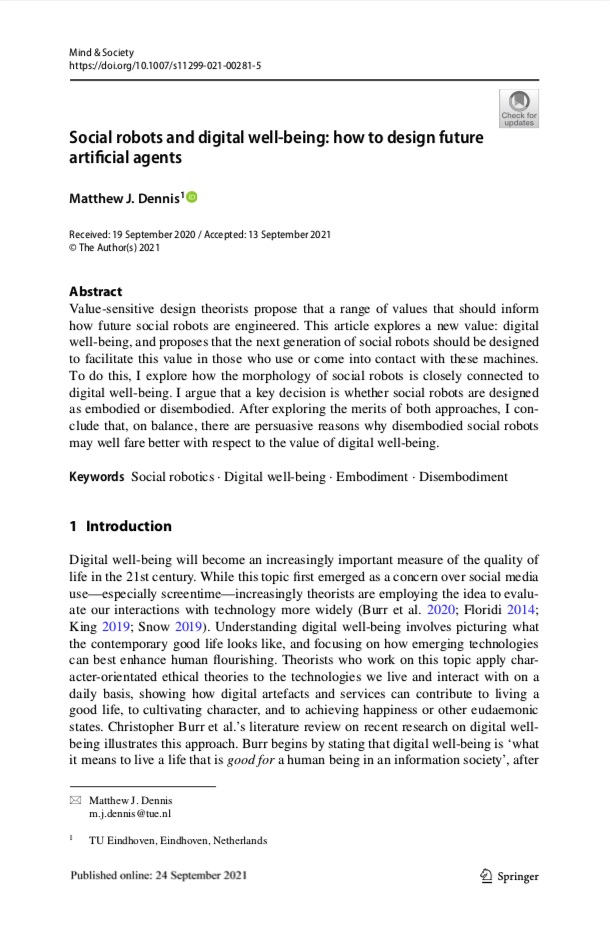
Value-sensitive design theorists propose that a range of values that should inform how future social robots are designed. This article explores a new value: digital well-being, and proposes that the next generation of social robots should be designed to facilitate this value in those who use these machines. To do this, I explore how the morphology of social robots is connected to digital well-being. I argue that we need to decide whether tomorrow's social robots should be designed as embodied or disembodied. After exploring the merits of both approaches, I explore why there may be persuasive reasons why disembodied social robots could be better aligned with the value of digital well-being.
.png)
Living well in the 21st century will present human beings with a unique set of demands and ethical challenges, many of which will require a rapid response to developments in the online space. Online activities increasingly permeate our practical lives. Although there is every indication that this activity will intensify, even experts on digital technology recognise that the precise effects of future emergent technology will be uncertain and remain unknown. We argue that character-based ethical approaches provides our best chance of creating a moral vocabulary that can guide us towards living well in the 21st century. The aim of this article is to offer the first outline of an educational model, founded on neo-Aristotelian theory, that illustrates how these qualities could be cultivated through moral education.
.jpg)
Self-care app companies have recently begun employing artificial intelligence (AI) to improve the functionality their products. This use of AI has already transformed – often enhancing – how many users experience online self-care. By dramatically narrowing the gap between offline and online self-care techniques, apps that incorporate AI have come close to replicating much of the face-to-face and personalised input of self-care gurus. Nevertheless, using AI to mimic and replace human agents invokes a cluster of interconnected ethical concerns. This article surveys the benefits that AI-enabled self-care products offer, and assesses the ethical challenges they must overcome.
 copy.jpg)
Enthusiasm for self-care apps has tracked recent ethical interest in self-cultivation, especially for our moral development. While self-cultivation is a relatively new topic in analytic moral philosophy, continental ethicists have been interested in it far longer. These ethicists view the notion of self-cultivation as having much value for the challenges of contemporary practical life, although precisely how they envisage this has (so far) confounded commentators. This article charts the recent rise in self-care app technology, focusing on apps that claim to shape our ethical development and our passionate characters. To do this, I examine the ethical issues that arise from self-care app companies using emerging technologies to cultivate our passionate attachments. Understanding these issues, I argue, can help us design self-care apps in better ways.
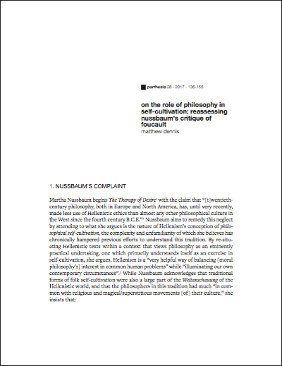
** Winner of Australian Society of Continental Philosophy Postgraduate Essay Prize **
Nussbaum's critique of Foucault's work on Hellenistic self-cultivation is severe. Not only is Foucault blind to the fundamentally important philosophical dimension of Hellenistic self-cultivation, his previous work disqualifies him from understanding the central role of reason, rationality, and logical argumentation in this tradition. Although Nussbaum is correct to say that Foucault's notion of the "care of the self" includes a greater range of practices and techniques than her own narrower account of philosophical self-cultivation, in this article I will suggest that the force of her criticisms miss the mark. Fully understanding Foucault's reading of the Hellenistic tradition shows that he thinks of techniques of self-cultivation as a necessary complement to philosophy, although on their own these practices cannot be considered as constituting philosophy itself.
Book Chapters
 copy.jpeg)
Increasing digital well-being is increasingly viewed as a key challenge for the tech industry, largely driven by the complaints of online users. Recently, the demands of NGOs and policy makers have further motivated major tech companies to devote practical attention to this topic. While initially their response has been to focus on limiting screentime, self-care app makers have long pursued an alternative agenda, one that assumes that certain kinds of screentime can have a role to play in actively improving our digital lives. This chapter examines whether there is a tension in the very idea of spending more time online to improve our digital well-being. First, I break down what I suggest can be usefully viewed as the character-based techniques that self-care apps currently employ to cultivate digital well-being. Second, I examine the new and pressing ethical issues that these techniques raise. Finally, I suggest that the current emphasis on reducing screentime to safeguard digital well-being could be supplemented by employing techniques from the self-care app industry.
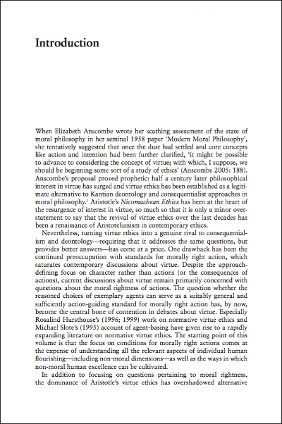
The aim of Ethics and Self-Cultivation is to establish and explore a new "cultivation of the self" strand within contemporary moral philosophy. Although the revival of virtue ethics has helped reintroduce the eudaimonic tradition into mainstream philosophical debates, it has by and large been a revival of Aristotelian ethics combined with a modern preoccupation with standards for the moral rightness of actions. The essays comprising this volume offer a fresh approach to the eudaimonic tradition: instead of conditions for rightness of actions, it focuses on conceptions of human life that are best for the one living it. The first section of essays looks at the Hellenistic schools and the way they influenced modern thinkers like Spinoza, Kant, Nietzsche, Hadot, and Foucault in their thinking about self-cultivation. The second section offers contemporary perspectives on ethical self-cultivation by drawing on work in moral psychology, epistemology of self-knowledge, philosophy of mind, and meta-ethics.
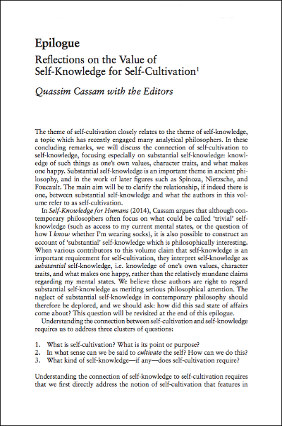
Philosophers invariably assume a conception of self-knowledge when they discuss self-cultivation, but the precise relationship between between self-knowledge and self-cultivation can be understood in different ways and often remains undertheorised. This epilogue examines how we can understand the relationship between self-knowledge and self-cultivation, making a case for what will be called a low-road explanation of the value of self-knowledge. To do this, the authors draw connections and contrasts with the chapters contained in the volume, and explore the idea that substantial self-knowledge as opposed to trivial self-knowledge deserves to be given more attention by contemporary philosophers
Opinion Articles

Existing ethical guidelines that aim to guide the development of mental health apps tend to overemphasize the role of Western conceptual frameworks. While such frameworks have proved to be a useful first step in introducing ethics to a previously unregulated industry, the rapid global uptake of mental health apps requires thinking more deeply about the diverse populations these apps seek to serve. One way to do this is to introduce more intercultural ethical perspectives into app design and the guidelines that aim to encourage best practices. In addition to this, existing ethical guidelines can also benefit from the ethical scholarship from the feminist and disability traditions, both of which highlight specific ethical considerations for vulnerable users. Rethinking the ethical responsibilities of mental health app designers through the prisms of feminism, disability studies, and intercultural philosophy leads us to a more global and inclusive set of ethical considerations in app design. This white paper explores what existing guidelines for the regulation of mental health apps are missing. It also explores how these guidelines could be improved for users who inhabit an increasingly diverse and globalized world.
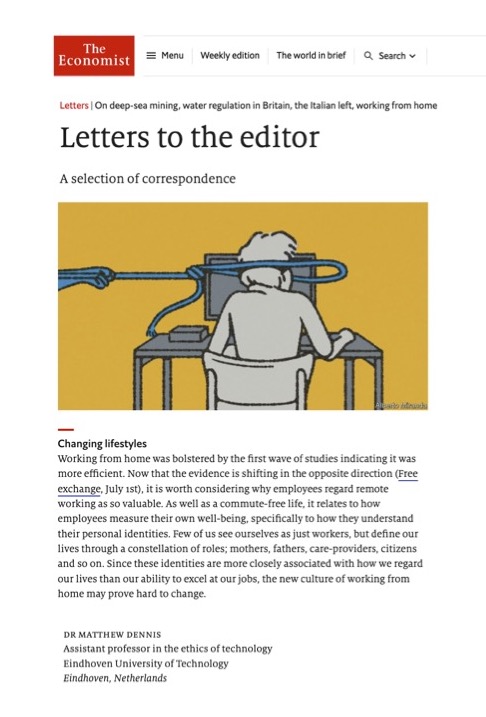
Working from home was bolstered by the first wave of studies indicating it was more efficient. Now that the evidence is shifting in the opposite direction (Free exchange, July 1st 2023), it is worth considering why employees regard remote working as so valuable. As well as a commute-free life, it relates to how employees measure their own well-being, specifically to how they understand their personal identities. Few of us see ourselves as just workers, but define our lives through a constellation of roles; mothers, fathers, care-providers, citizens and so on. Since these identities are more closely associated with how we regard our lives than our ability to excel at our jobs, the new culture of working from home may prove hard to change.
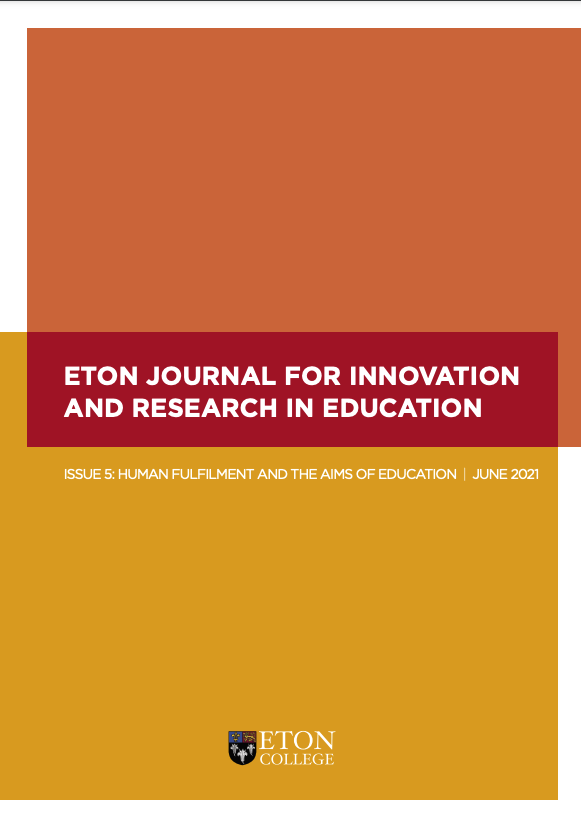
Digital technologies are changing many aspects of the educational environment. Given the pace of technological change, it is easy to get distracted by how emerging technologies are transforming how we educate children and young people, as well as how they are educating themselves. Smartphones inside (or outside) of the classroom, online proctoring, gamified learning activities, unlimited educational content (podcasts, videos, or virtual assistant teachers), and the ability to ask Google anything in real-time have transformed education in ways that few could even imagine a decade ago. These changes should not be underestimated. Nevertheless, it is vital to recognise that online technologies are changing the purposes of education too. This article examines the extent to which social media provides the conditions for children and young people become socially and politically active, and how online celebrities and influencers can help them do this.
.png)
Over the last decade, techniques of self-directed character change have undergone a revolution, one that promises to fundamentally rewrite the way we understand the cultivation of character. This revolution has been supercharged by rapid advances in digital technology, as well as increasing public attention regarding the benefits of tracking, monitoring, documenting, and shaping the self. Part of the difficulty in following the march of this zeitgeist is that it is so ubiquitous and diffuse. It infuses our perceptions and values of healthcare, education, business, leisure, in addition to fuelling our seemingly insatiable appetite for the ‘self-care’ industry. The idea that our characters can – indeed should – be actively cultivated is now so integral to the 21st century experience that it would be hard to understand a host of contemporary human practices without this assumption. In this paper, I explore how technology can help us change or improve who we are through digital regimens of self-cultivation.